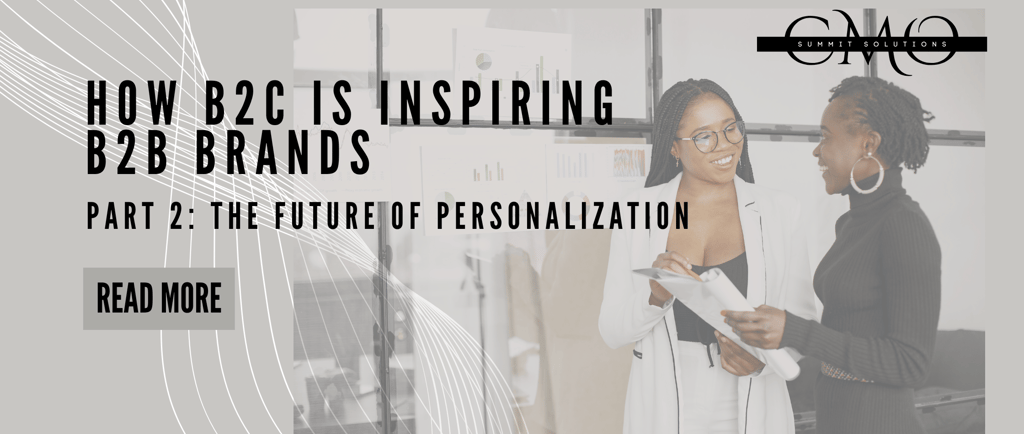The Future of Personalization
Part Two in our Series of how B2B Marketing is taking on B2C Strategies
Lauran Hundshamer
7/9/20252 min read


Why Personalization Matters in Modern Marketing
The impact of personalization is clear:
80% of consumers are more likely to buy from a brand that offers personalized experiences.
B2B buyers now expect the same intuitive, customized interactions they get from B2C brands.
Personalized emails and website experiences have been shown to increase engagement, reduce churn, and drive revenue.
But the traditional methods of personalization, think static segments or basic name insertions through html, are no longer enough. Enter artificial intelligence.
How AI Is Reshaping Personalization in B2C Marketing
AI personalization is revolutionizing how brands engage with customers across the entire funnel. In the B2C world, it’s all about real-time adaptation and hyper-relevance.
Here’s what that looks like:
Dynamic product recommendations based on browsing history, past purchases, and behavior across channels.
Predictive analytics that forecast what customers will want next, before they even know it.
Smart content delivery, where AI tailors homepage banners, email content, or push notifications based on customer profiles.
Conversational AI and chatbots that adjust their tone, speed, and responses to fit a customer’s preferences and personality.
Big players like Amazon, Netflix, and Spotify have set the bar high—but small and mid-size B2C brands are catching up quickly using platforms like Klaviyo, Shopify, and Meta Ads powered by AI engines.
AI-Powered Personalization in B2B Marketing
While B2B personalization may seem slower to evolve, AI is now transforming complex buying journeys with increased precision.
Here’s how:
Account-based marketing (ABM) powered by AI helps identify and prioritize high-value accounts based on engagement and intent signals.
AI-driven email workflows adapt based on individual stakeholders’ behaviors, job roles, and stage in the buyer’s journey.
Predictive lead scoring and intent-based targeting help sales and marketing teams engage the right buyers at the right time with the right message.
AI tools are also streamlining content customization, auto-personalizing pitch decks, proposals, and LinkedIn messaging for individual companies and decision-makers. In other words, AI is enabling a shift from persona-level marketing to individual-level engagement, even in B2B.
Benefits of AI-Driven Personalization
AI allows brands to personalize at scale, going far beyond what human teams can manage manually.
With machine learning, marketers get real-time feedback loops to understand what’s working—and what’s not.
Personalized marketing has been shown to lift conversion rates by 10–15% or more in many industries.
The more seamless and relevant the journey, the more likely customers are to stay loyal.
The Tools Powering AI Personalization
If you're looking to future-proof your personalization strategy, here are some tools driving innovation:
Salesforce Einstein predictive lead scoring, personalized content
HubSpot with AI-powered segmentation and workflow automation
Drift and Intercom conversational AI for B2B sites
Optimizely and Dynamic Yield site personalization platforms
Adobe Sensei creative and data-powered personalization for enterprise
